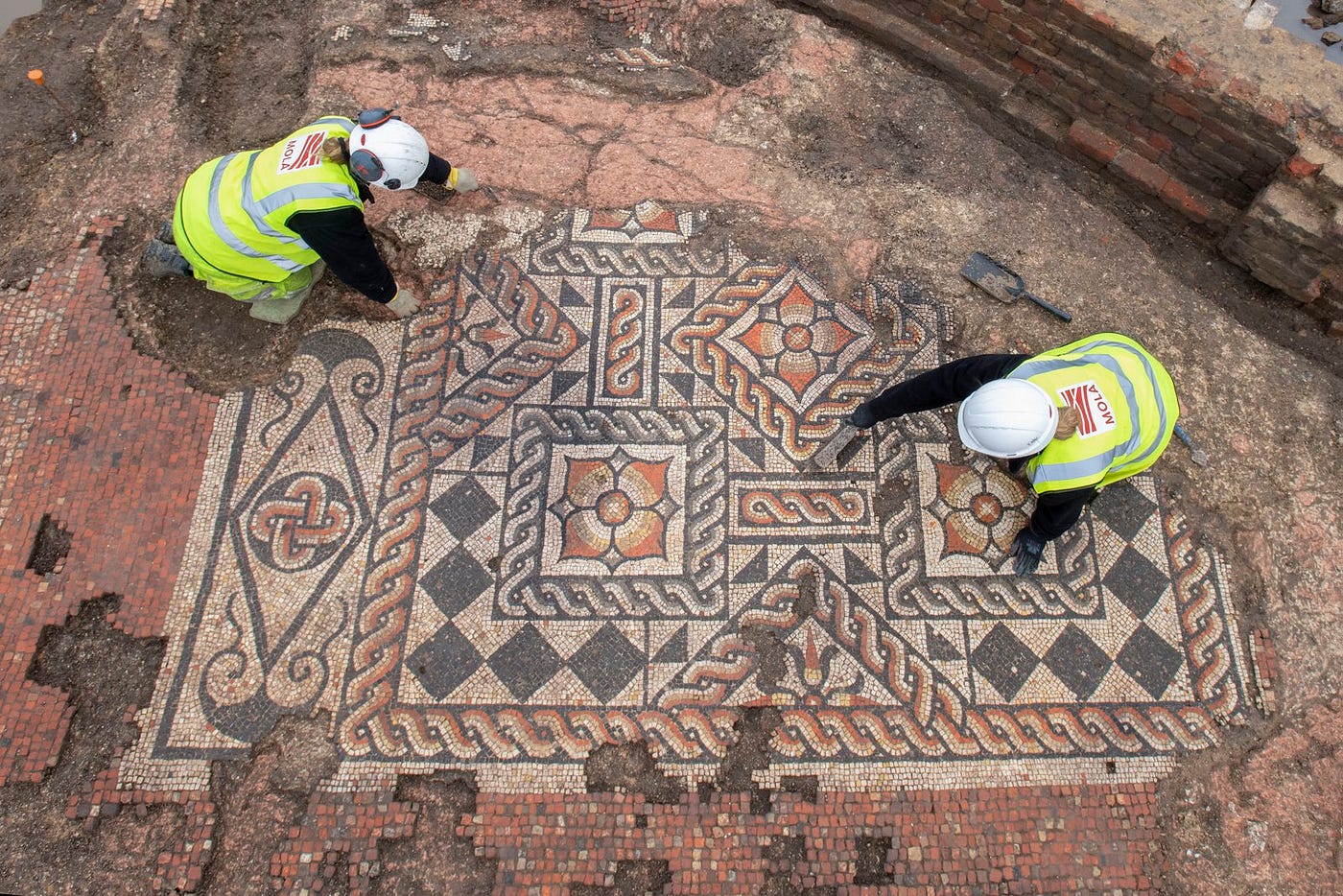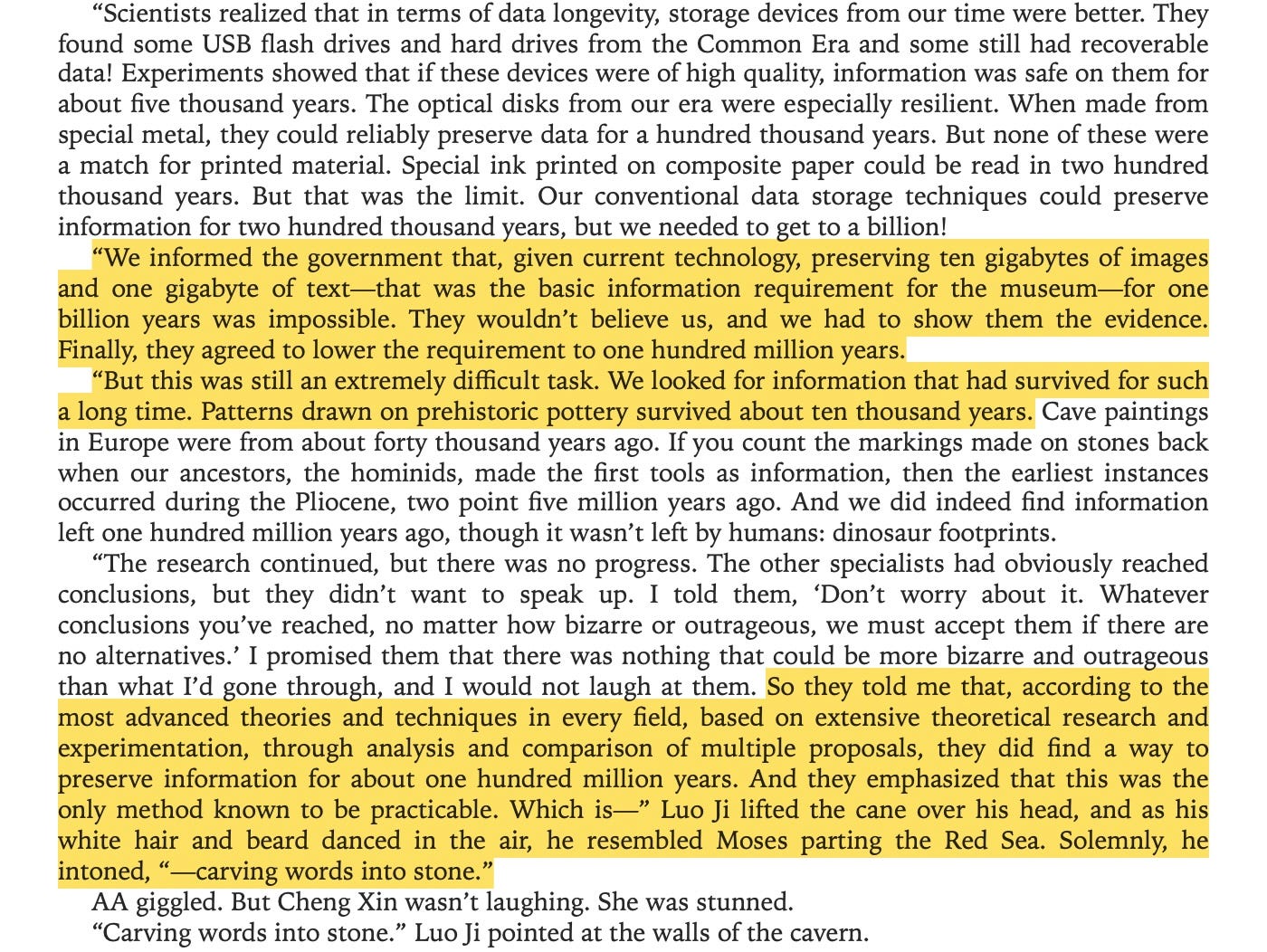How Modern Civilization Is So Temporary

I was walking up the stairs at the St. Something train station and I saw a mural. It was so garish and cheap. So temporary. You can dig up someone’s bathroom from centuries ago and it’s art. This was just advertising. Such is the nature of everything under capitalism. Everything is built for the next quarter, nothing for the next quarter-century, and it actively destroys the next quarter millennia entirely.
You can feel it when you walk into an old church, or round an old stupa, or see the pyramids. What were they thinking? How did they do it? People built things they might never see finished, but which have lasted for centuries.Then you look around at what we have built. What does it even mean? We build office towers and casinos, and then demolish them to build other ones. They’re all effectively temporary. We build roads that get weathered away to drive cars that get replaced every 10 years.
When we built our house our father-in-law contributed (among other things) reclaimed wood from an old spinning factory. Big, thick beams that you can’t get anymore, they must have been a hundred years old. An antiques dealer came to the house, looked around, and said the whole place would be worthless one day, except for the beams. It’s true. All of the fittings become outdated and degrade, the walls are cheap brick, the TVs and appliances get updated, we contribute to our own convenience and nothing to posterity.
This person Wrath Of Gnon said “Roger Scruton famously said ‘Put usefulness first, and you lose it. Put beauty first, and what you do will be useful forever. It turns out, nothing is more useful than the useless.’” Wrath talked about how to make beautiful, timeless buildings using three principles:
I. the materials we build with must still be around in a thousand years time.
II. the tools and techniques we build with must be transferrable so as to pass down through the generations and it must be possible to repair or replace every single part.
III. the purpose that we build for must be at the core of the human experience.
This is of course precisely how we don’t build things anymore. People build networked ‘smart’ homes which are outdated almost immediately and become inoperable and useless within a decade. Old WiFi standards simply won’t work anymore, USB charging standards will change, and code will rapidly get devoured by viruses left unmaintained. Booting up a ‘modern’ smart home in five years will be like trying to play a Laserdisc today. And we live in these things.
Everything is designed around being immediately useful, soon replaced, and soon enough obsolete. Like I said, all we ultimately leave for posterity is our garbage. Ugliness can also be forever, and that’s ultimately what we leave. I suppose this is the logical end for the cult of private property. The complete destruction of public works, of the living planet, all sacrificed on the altar of a flickering and banal prosperity.
I think of this at the train station because the privatized English train system sucks, certainly relative to what it was as a public service. The trains are slow, expensive, and cover less stations than they did before. This is all more immediately profitable, but the obvious consumer incentive is to just buy a car. It’s cheaper, faster, and better, though of course immeasurably worse for everyone in the future. This is what capitalist ‘efficiency’ really is. It’s a timing difference, it’s a con. It’s like burning your own house down and crowing about how easy and cheap it is to get warm. And then your grandchildren are homeless forever.
I think of this especially in England, because the whole place is like walking around a carcass. We’re in Oxford now and the old, stone colleges are there and effectively timeless while the new one we’re in has to be completely renovated because it’s already so falling apart and absurd. The price of modern convenience is really the destruction of long-term civilization. We are temporary people creating a temporary world. In the heat of our attachment to immediate pleasure, we lose the future, the past, and even the enjoyment of the present itself.
In the excellent science fiction trilogy The Three-Body Problem (massive spoiler alert, but whatever) the world is ending and people want to preserve some trace of their civilization. They realize that all modern digital technology won’t preserve shit and assemble a committee to find something truly futuristic. After much research, do you know what they found would preserve the longest? Carving words into stone. As the ancients did. All of our vaunted progress since those first signs of intelligence has ultimately been ephemeral.

The Canadian communication theorist Harold Innis talked about this insight in his book Empire & Communications. He talked about ‘heavy’ and ‘light’ media. Heavy media like stone would transmit across time while light media like papyrus would transmit across space. The latter he thought was more conducive to Empire.

Of course, long-lasting structures like the pyramids were built by empires, which used papyrus in order to move the stones. And yet there is still something about the pyramids reaching to the gods that continues to this day, while the scribbles of scribes disappeared long ago.
I digress cause these are literally the thoughts going through my head wandering through a train station, before one of my children sees something first (a great honor) and the other one screams at being left out. And this snaps me out of it. My point is not that everything is shit now and things were better back then. The fact is that people throughout history have been saying this forever. Socrates was disappointed that dudes were even writing stuff down, saying “it will atrophy people’s memories” and that “this spurious appearance of intelligence will make them difficult company.” We of course only know about this because Plato wrote it down lol.

Confucius was always going on about how shit his age was and how the Dukes and Kings of yore were so much better, and each following ‘Confucian’ scholar just reported that things were getting worse and worse. Which I think, is true. The entire history of Homo Sapiens has been us leaving the bosom of something truly long-living—the living Earth—and trying to conjure up eternal life for ourselves, alone. Even what I hark back to as the ‘eternal’ artifacts of civilization are themselves temporary, just on a different scale.
As Adam Frank, one of the authors of the Silurian Hypothesis says, “After a few million years, Earth is pretty much resurfaced. You’re not going to have any statues, buildings, or anything left.” The Silurian Hypothesis is that another similarly advanced civilization could have already come and gone on Earth. We actually wouldn’t know, and future civilizations could also come and go without knowing about us either. The little chemical stains we leave and easily be mistaken for background noise, or the planet just farting.
My point here is that what I notice on those train stairs is really the closing stages of a spiral. We left the ‘Garden of Eden’—our biological connection to the eternal—and strayed further and further, trying to remake life in our own image. We went from creating things in stone to wood to paper to light. Sages have noticed things getting progressively more shit for millennia, and now we reach the final denouement they were talking about. “Fuck around and find out,” they all said. And here we are.
So I walk past a cheap mural put up by some cheap company which insists on squeezing so much profit out of rail that people just pop out of train seats and into cars. I eat food out of plastic and stay in houses made of plaster, pulling on a vape that won’t even work in two weeks and just gets thrown away. That’s what we’ve done with the whole world, starting not just this century or last millennia but going back to the first moment that someone carved something into stone at all. By daring to represent the world we destroyed it. We stopped being in it, being a part of it, and started living in a simulation. We live in a representation of reality, not the actual present. And the fire of our dreams is now engulfing the ‘real’ world.
“What does it profit a man to gain the world and lose his soul?” the Bible says, and the answer is a lot, obviously. But the entire capitalist motive is based on quarters, maybe quarter centuries, and not the longer timescales the Bible operated on. Change your perspective and you get another answer, also obvious. You lose it all. You never had it. It was just scribblings on a wall.